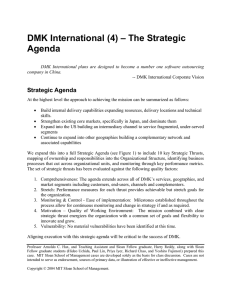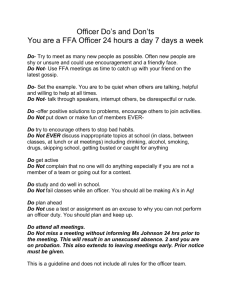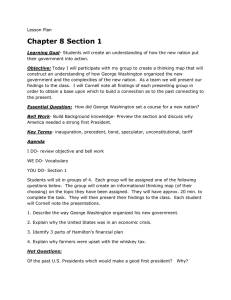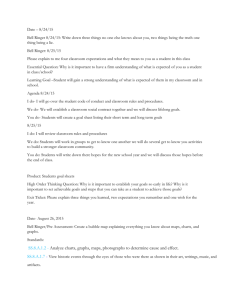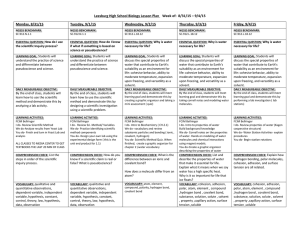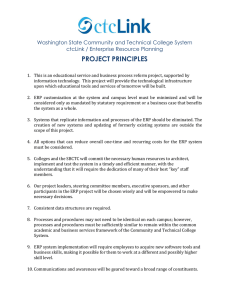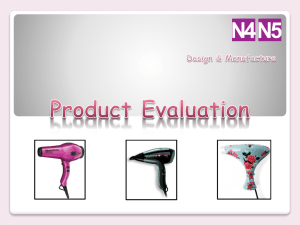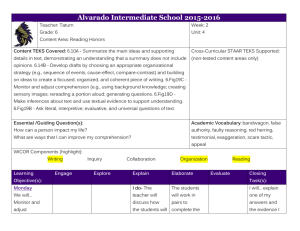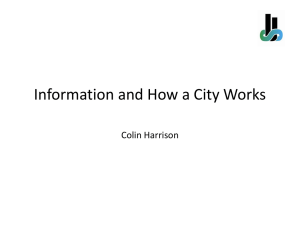DMK International (7) – Innovation (I) Innovation Strategy
advertisement
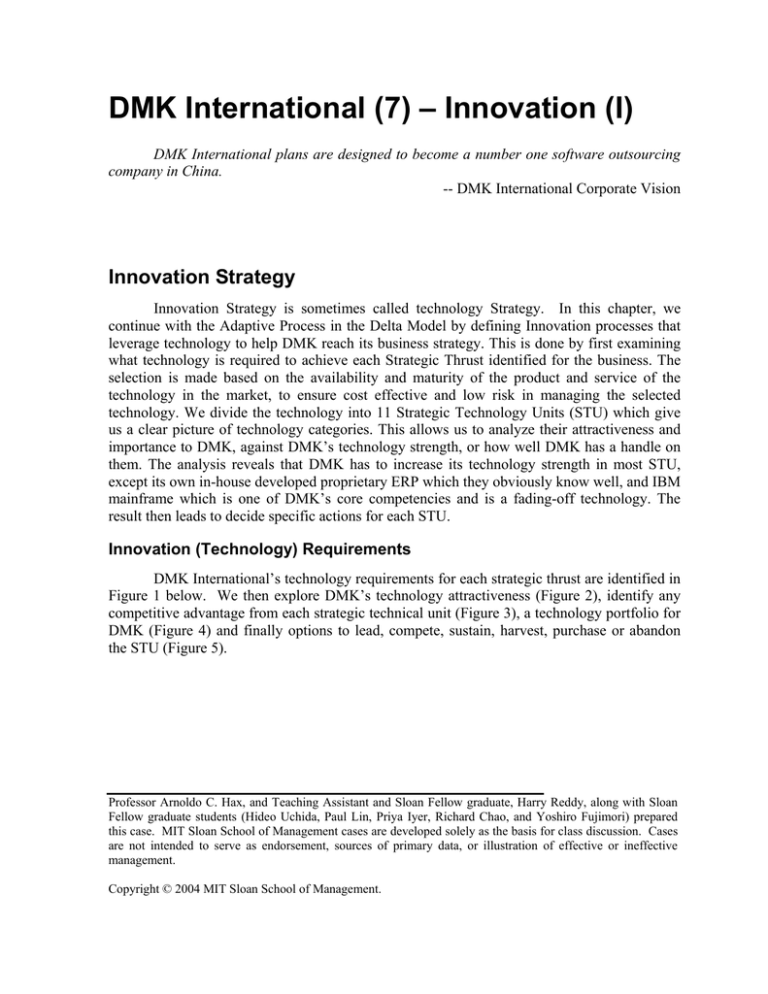
DMK International (7) – Innovation (I) DMK International plans are designed to become a number one software outsourcing company in China. -- DMK International Corporate Vision Innovation Strategy Innovation Strategy is sometimes called technology Strategy. In this chapter, we continue with the Adaptive Process in the Delta Model by defining Innovation processes that leverage technology to help DMK reach its business strategy. This is done by first examining what technology is required to achieve each Strategic Thrust identified for the business. The selection is made based on the availability and maturity of the product and service of the technology in the market, to ensure cost effective and low risk in managing the selected technology. We divide the technology into 11 Strategic Technology Units (STU) which give us a clear picture of technology categories. This allows us to analyze their attractiveness and importance to DMK, against DMK’s technology strength, or how well DMK has a handle on them. The analysis reveals that DMK has to increase its technology strength in most STU, except its own in-house developed proprietary ERP which they obviously know well, and IBM mainframe which is one of DMK’s core competencies and is a fading-off technology. The result then leads to decide specific actions for each STU. Innovation (Technology) Requirements DMK International’s technology requirements for each strategic thrust are identified in Figure 1 below. We then explore DMK’s technology attractiveness (Figure 2), identify any competitive advantage from each strategic technical unit (Figure 3), a technology portfolio for DMK (Figure 4) and finally options to lead, compete, sustain, harvest, purchase or abandon the STU (Figure 5). Professor Arnoldo C. Hax, and Teaching Assistant and Sloan Fellow graduate, Harry Reddy, along with Sloan Fellow graduate students (Hideo Uchida, Paul Lin, Priya Iyer, Richard Chao, and Yoshiro Fujimori) prepared this case. MIT Sloan School of Management cases are developed solely as the basis for class discussion. Cases are not intended to serve as endorsement, sources of primary data, or illustration of effective or ineffective management. Copyright © 2004 MIT Sloan School of Management. Figure 1: Innovation (Technology) Requirements from Thrusts Strategic Thrust Technology Requirements 1 Invest in people, train and motivate. Hire Need central system to track skills by associate and request specific skills for porjects. outstanding talent. Develop strong Need web based self training and class-room type group training technology. technical design capabilities. Require knowledge management intranet. Need design tools like Rational Rose, etc. for system design. 2 Expand nationally leveraging government Require global resource management (request, allocation, and projection) software. programs to develop global delivery Require global time and expense entry/tracking and billing software centers throughout China. Require global client/project profitability tracking software 3 Work with exclusive channel partners to develop horizontal frameworks (portals, content/doc management) and industry specific solution sets (energy, publishing, financial services) for rapid development. Need rapid prototyping tools (VB, frontpage, rational rose, etc.) Rapid development frameworks for .NET and J2EE based architectures Horizontal application frameworks for CMS and Portals Vertical solution sets for Energy and Financial Services industry Need VPN and T1 links for tier-1 clients 4 Dominate IBM mainframe outsourcing market in Japan through aggressive sales Require CRM system for contact management, lead tracking, sales forecasting, account planning, etc. and marketing programs. 5 Strengthen strategic relationships (e.g. IBM, GE, Kawasaki, Unisys) through deep customer understanding/integration and continuous improvement. Need client extranet infrastructure for security and ease of integration Need on-demand collaboration software such as instant messaging, conference bridge, MS LiveMeeting, etc. Need shared source code control deployable globally Innovation (Technology) Requirements from Thrusts (continued) Strategic Thrust Technology Requirements 6 Develop strong direct-marketing program Develop marketing oriented website and secure high placement in leading search to target the intermediary service provider engines Develop direct marketing engine for campaing mgmt with closed loop tracking for channel in the US. analysis 7 Actively pursue US based Consulting/highend IT Service firms to become their exclusive provider of design, development, & maintenance services Develop centralized demo infrastructure and vertical solutions to help sales Develop direct marketing engine for campaing mgmt with closed loop tracking for analysis Deploy CRM system for contact management, lead tracking, sales forecasting, account planning, etc. 8 Develop an engagement program with processes to ensure long-term, successful integration of offshore DMK team with local service firm. Build VPN and T1 links to tier-1 clients Need client extranet infrastructure for security and ease of integration Need on-demand collaboration software such as instant messaging, conference bridge, MS LiveMeeting, etc. Develop knowledge transfer/client training infrastructure deployable gloabally Develop support for German and other european language characters as required 9 Expand to UK and test EU (Germany, France, Italy) using an intermediary partnership network similar to US-strategy. Extend architecture/solution sets to support multi-language deployments Develop localized demos within centralized infrastructure to help sales 10 Enter and test the Latin American market (Brazil, Mexico, Chille) also through an intermediary partnership network. Develop support of Portuguese and Spanish language characters in frameworks (unicode) Develop localized demos within centralized infrastructure to help sales Figure 2: Technology Attractiveness Highly Unatt. Potential for Enhancing competitive advantage in: Product application Process application Impact on value-added chain Cost Performance Quality Differentiation Proprietary positions available Rate of technological change Impact on entry barriers Impact on alternative technologies Maturity and volatility complexity Mildly Unatt. Neutral Mildly Att. Highly Att. ● ● ● ● ● ● ● ● ● ● ● ● ● ● Figure 3: Identification of STU’s for Competitive Advantage # Strategic Technical Unit Description 1 Proprietary ERP for strategic management Technology required to track skills, global resource management, time & expense tracking, client/project profitability 2 Integrated (transparent) Development tools Combination of high-speed T1, VPN, tools for integrated source code and iteration management to create greater transparency between development team and client teams 3 Collaborative technologies An integrated suite of technologies including audio & video conferencing, MS LiveMeeting, Instant Messaging, etc. to facilitate demos, distance learning, knowledge transfer, etc. 4 Rapid prototyping and Design tools Tools to facilitate the development of horizontal application frameworks and vertical solution sets with strategic complementors (i.e. complementary service providers) 5 Customer Relationship Management Centralized system to facilitate contact management, lead generation, campaign tracking and system analysis, sales forecasting, account management, etc. 6 Application servers Frameworks for key server technologies such as J2EE (Websphere, Weblogic, Domino), MS .NET for rapid code development 7 Portals Portal solution platforms including Plumtree, Epicentric, MS Sharepoint for integrated user interface design and deployment 8 Enterprise Application Integration Technologies such as TIBCO and WebMethods to facilitate workflow integration, composite application management, business activity monitoring and business process management 9 IBM Mainframes Continue this area of technology strength to outsource critical legacy business systems 10 Oracle ERP Acquire deep technical expertise in Oracle ERP to dominate this niche market 11 Data Warehousing ETL tools to extract, translate and load data; star schema design tools; analysis tools such as Business Objects, Cognos for business intelligence Figure 4: Technology Portfolio Matrix Technology Attractiveness High High Medium Low 1 5 3 Medium Technology Strength 9 6 2 7 8 10 Low 4 11 STU Representation 1. 2. 3. 4. 5. 6. Proprietary ERP for strategic management Integrated (transparent) Development tools Collaborative technologies Rapid prototyping and Design tools Customer Relationship Management system Application servers 7. 8. 9. 10. 11. Figure by MIT OCW. Portals Enterprise Application Integration IBM Mainframes Oracle ERP Data Warehousing Figure 5: STU Options STU Proprietary ERP for strategic management Integrated (transparent) Development tools Collaborative technologies Rapid prototyping and Design tools Customer Relationship Management system Application servers Portals Enterprise Application Integration IBM Mainframes Oracle ERP Data Warehousing Lead Compete Sustain Harvest Purchase Abandon Environment Scan a. Identification of Opportunities and Threats In the first part, we benchmark DMK against one of their primary competitors, Tata Consultancy Service (TCS), to understand where DMK stands in selected indicators for strategic performance of technology. Being a smaller and relatively much younger company, DMK appears to have more impact on rate of new product introduction, and process capability. Its HR is also more flexible in terms of project rotation and response to customer needs. On the other hand, TCS leads by far in technological innovation. TCS has established several leading centers of expertise in India, and innovated IT tools and development methodologies through leveraging its strong software skills and experience. In the second part of the Innovation environmental scan, we identify its technological opportunities and threats, based on several environmental perspectives such as: Market factors Economic factors Government and political factors Regulatory factors Technical factors Legal factors Social factors Environment factors See Figure 6 and Figure 7 for DMK’s competitive standing and an environment scan to identify opportunities and threats. Figure 6: Competitive Standing - Strategic Performance Measurement of Innovation (Technology) Relevant Competitor: Tata Consultancy Service (TCS), based in India Indicators Rate of technological innovation Very Weak Weak Strong ● Technology productivity Rate of return in technology investment Even ● ● Resources allocated ● Impact of rate of new product introduction ● Impact on process capabilities ● ● ● ● Impact on technology-based diversification Royalties or sales of technology Training time of people on new technology Level of technological competence ● Human resources Patent positioning ● ● Very Strong Figure 7: Innovation (Technology) Environment Scan - Identification of Opportunities and Threats Impact Critical external factors Positive (Opportunities) Market Factors Mature market and domination by key technology leaders Low risk in investing in leading technology In Japan, high demand to maintain or improve mainframes and related systems under pressure of cost reduction Low risk of investing in mainframe related technology and skills In US, Indian offshore outsourcing firms have already been bonding with large sized clients. Nil In Japan and US, mid-sized corporations have huge potential demand of offshore outsourcing. New markets with little or no competition Negative (Threats) More competition because competitors also go for the same technology Competition and increasing demand for both efficiency and quality in supply chain Limited chance of acquiring customer technology domain knowledge Lack best practices Innovation (Technology) Environment Scan - Identification of Opportunities and Threats (continued) Impact Critical external factors Economics Factors World economy is improving as indicated by key indices such as Dow Jones, NASDAQ, and other world market and analysis data. China becoming WTO and consistent GDP growth of 8% Positive (Opportunities) Capital spending is expected to rise in developed countries, leading to increase demand on wide range of leading technology. Stable economic growth leading to stable supply and support of technology and technical personnel Negative (Threats) High cost if invested in wrong technology Cost of acquiring technology may rise fast Innovation (Technology) Environment Scan - Identification of Opportunities and Threats (continued) Impact Critical external factors Positive (Opportunities) Government & Political Factors Relief in import of technology equipment in India and China Required technology is more readily available and cost is expected to be lower Promotion of partnering with foreign corporations Offshore development centers are likely to be built Further support on country infrastructure Faster implementation and lower cost Negative (Threats) Nil Nil Nil Innovation (Technology) Environment Scan - Identification of Opportunities and Threats (continued) Impact Critical external factors Regulatory Factors China’s recent new regulation on liberation of human capital inter-city mobility Positive (Opportunities) Negative (Threats) Technologically skilled people are well spread within China which helps make increase overall national technology skills, and in business domain knowledge Concentration of labor force in higher income cities such as Beijing and Shanghai will drive labor cost up quickly Impact Critical external factors Technological Factors IT trends keep changing Technological enhancement is becoming key to success due to competition Positive (Opportunities) Negative (Threats) Easier to differentiated from competitors New revenue opportunities as new requirements evolve Wrong or obsolete solutions for own infrastructure or for customers Create differentiation with speed in high technology and service High capability in marketing and strategic resource allocation Innovation (Technology) Environment Scan - Identification of Opportunities and Threats (continued) Impact Critical external factors Legal Factors Poor management of license piracy problem in China Positive (Opportunities) Nil Negative (Threats) Confusion in the use of license, and risk of being sued due to unclear rules Impact Critical external factors Social Factors Group of organizations in China favor only technology developed in China as an effort to support homeland technology Positive (Opportunities) High barrier for foreign competitors to acquire skills Negative (Threats) Limit in knowledge sharing as it is only unique in China Innovation (Technology) Environment Scan - Identification of Opportunities and Threats (continued) Impact Critical external factors Positive (Opportunities) Negative (Threats) Environment Factors Nil China’s focus and heavy investment on telecom infrastructure has allowed remote real time support. Also, India’s free trade zones such as SEEPZ in Mumbai has stable telecom infrastructure. Reduced risk of remote support and increased offshore outsourcing value proposition Internal Scrutiny DMK has a clear picture on positioning each phase of its innovation decision making process. In the area of technology intelligence, DMK has clear idea on importance, relevance, threat and opportunity underlying each category to its business. Each product is well-defined in a way that complementary to each other to fully utilized company’s resources. In technology selection, the company posed a sophisticated metric system with focus on potential market size as well as speed to ramp-up resources. The company is very flexible and market-driven in determining timing of new technology introduction, given the speedy nature of technology advance. The company is also flexible and effective in acquiring new technology. Multi-channel is utilized to facilitate speed of acquisition. In horizontal strategy of technology, their business units are based on geographies, but technology is the key to integrate all these dispersed units. In projection selection, evaluation, resource allocation and control, the company has a dedicated team for critical internal application, which is very effective in allocating its resources. And lastly, the company has a well-established mechanism for decision flow, which is essential before any work flow type of technology is implemented. The company is also strong in documentation of their innovation result, which may set standard for the industry in China. See Figure 8 for further detail. Figure 8: Characteristics of Present Innovation (Technology) Policies Regarding Major Decision Making Categories Decision Category Description of Policy Technology Intelligence ERP – Developed own ERP system, for workflow management, integrating information across all departments. Gather data, manage and monitor performance. Make development process more transparent to clients. Video Conference – important to gain confidence about facility in China. To get over culture gap. Java, Domino – Common Portal- growing, establish center of excellence EAI(WebMethods)-fast growth, not many competitors with expertise in this, can be an advantage to dominate in Chinese market Mainframe- high entry barrier, not a growth market, cash cow, stable market Oracle ERP – high barrier to entry, high margin Data warehousing – continue to explore Strengths Well understanding on products strength And market technology trend. Competitive advantage Weaknesses Limited resources, and to focus on future cash cows. Not easy to find partner, high entry barrier Characteristics of Present Innovation (Technology) Policies Regarding Major Decision Making Categories (continued) Decision Category Technology Selection Description of Policy Strengths Objective Formal process for selection, metric established Highly includes market potential, costs (entry barrier), accurate speed to ramp-up resources, competitors strength, Resourced return of investment, existing knowledge, etc. based Assign weights to different dimensions. Potential market size, growth rate and speed to ramp-up resources are key factors. Market entry costs are least important. Decision Category Description of Policy Strengths Very flexible, Mostly looking at returns on specific Timing of market-oriented technology in the short term. new approach. No sense (bias) on the long run as technology Financial based technology changes fast. If ramp-up takes introduction too long, it make on sense to invest. Not in the business of bleeding edge tech. It has to be some what mature to get it. Weaknesses May sacrifice long-term benefit for short term benefit Weaknesses Located at developing countries, risk of time lag to obtain advance tech. Characteristics of Present Innovation (Technology) Policies Regarding Major Decision Making Categories (continued) Decision Description of Policy Strengths Weaknesses Category Need to be Very flexible Multi-modes for technology acquisition. Mode of very sensitive multi Internal development of technologies is used most often technolog on trend of channel to for technologies that are integral to the services it y technology acquire provides. acquisitio development technology. The company acquires technology such as video n conferencing technology for use in the delivery of services. Licensing of technology is also very common and occurs for most platform software that is the customized by the company. Set up one joint venture with IBM, Japan and is open to doing more. Have many alliance partners who serve as complementors and are critical to its strategy. Characteristics of Present Innovation (Technology) Policies Regarding Major Decision Making Categories (continued) Decision Category Horizontal strategy of Technology Description of Policy Business units by geographies. Technology is the key to the integration of these geographically dispersed units. Proprietary ERP system is used across all business units. The company’s software delivery methodology with CMM5 and 6-sigma processes provide and enforce a common set of process across the entire organization, technology such as video conferencing and other software add value to the client relationship and greatly facilitates integration, Common development frameworks and solution sets allow re-use across projects Strengths High quality products, standardized process. Weaknesses Maybe higher cost compared to competitors with no process – need to sell value Characteristics of Present Innovation (Technology) Policies Regarding Major Decision Making Categories (continued) Decision Category Description of Policy Project selection, evaluation, resource, allocation, and control Dedicated team for critical internal application, owns its CDQs. For other non-critical projects, use resources on the bench. Group TSG (tech support group) lead by CTO, constantly surveying market, collect feedback from people in the field and make recommendations. Strengths Effective allocation of resources on dedicated team Weaknesses Need to expand and replace technology Available in the bench from time to time. Characteristics of Present Innovation (Technology) Policies Regarding Major Decision Making Categories (continued) Decision Category Description of Policy Technology organizatio n and managerial infrastruct ure Horizontal deployment of technology – 2 sources Technology group makes request, submits to CTO who make final decision. For development project gets transferred to development team. They fill out request, send to TSG, and enter approval process. TSG will drive initiatives and push it our horizontally. Development solutions that do get patented (20 to 30 patents), but product sales not a major business. Application solutions that can be customized. Couple of publications, software development trends, also published a book. Set standard for China-brand awareness. And help to get complementors. Strengths Welldefined mechanism for decision flow. Good on documentat ion Weaknesses May take long in decision – need to further define process for quickest possible decision response Innovation (Technology) Strategic Agenda Having identified Technology Requirement, STU’s, Technology Portfolio Matrix, STU Options, Internal Scrutiny, and Environmental Scan, we now have all the information to focus on the Technology Strategic Agenda for DMK. We formulated 11 specific thrusts as shown in Figure 9, with owners and primary and secondary participants for each. We also identified the type of business process and key performance measures for each. In this section we summarize these by two broad groupings based on priority and resources. In order of priority, they are: a. Streamline, Integrate and Innovate in Technology Infrastructure Technology thrusts included in this category provide DMK the infrastructure required to perform its business. DMK’s in-house proprietary ERP system is critical to its day-to-day business operations. It needs to be enhanced for global operations and deployed globally as a common platform for resource management, forecasting, planning, revenue and profitability tracking. Further, all global development centers (GDC’s) of DMK need to be standardized on the same set of collaboration tools and customer relationship management tools to facilitate crossoffice and client meetings, demos, training, knowledge transfer and other delivery, sales & marketing needs. The analysis and design phase of the project requires integrated set of rapid prototyping and design tools to facilitate joint development of vertical solution sets with strategic partners. The existing development environment on ClearCase needs to be customized to create transparency for the client during the development phase. b. Build Technology Knowledge and Capabilities for Client Services This includes Technology Thrusts that are critical to DMK for providing the specific consulting and IT services to clients and strategic partners. Key thrusts identified include selecting application servers and developing frameworks for rapid coding, developing a center of excellence for Portals which continues to remain a growing market and Enterprise Application Integration (EAI) technologies. Also included is the need to maintain dominance in mainframe technologies which is critical to the core Japanese market. Having chosen Oracle ERP as a growth platform, DMK needs to strengthen this partnership and develop deeps skills and solution sets for this niche market. Finally, analysis and design tools for data warehousing combined with solution sets for specific markets will continue as a technology thrust for DMK. Figure 9: Innovation (Technology) Strategic Agenda 1 1 1 2 2 2 Businesses Processes Technology Strategic Thrusts Streamline, Integrate, and Innovate in Technology Infrastructure 1 Enhance proprietary ERP for global operations and deploy globally as common infrastructure for resource management, forecast and planning; revenue & profitability tracking. Chief Technology Officer Technical Team Leads Vice President Operations Regional President - US Regional President - Japan Regional President - China Vice President Sales Vice President Marketing Chief Financial Officer VP Human Resources Organizational Units Performance Measures # of GDCs on ERP, speed of 1 1 OE deployment, number of users and freq of use, user satisfaction 2 Customize ClearCase development environment to allow secure client access to sand-boxed iteration releases to enhance transparency during development phase 1 1 1 2 2 2 3 Standardize all GDC's with collaborative tools such as audio/video conferencing, MS LiveMeeting, InstantMessaging, shared servers, VPN, etc. to facilitate demos, training, knowledge transfer, etc. 1 1 1 2 2 2 2 2 1 4 Evaluate, procure licenses and implement an integrated set of rapid prototyping and design tools to facilitate joint development of vertical 1 1 1 2 2 2 solution sets with strategic partners I Client satisfaction, increase in client profitability, development & account team satisfaction Ease & frequency of use, cost OE effectiveness, client satisfaction, project profitability 2 5 Deploy centralized customer relationship management system with 1 1 2 2 2 1 1 2 global access to meet identified sales & marketing needs Build Technology Knowledge & Capabilities for Client Services 6 Evaluate, select and obtain site licenses for application servers (J2EE: Websphere, Weblogic; MS .NET)and develop rapid 2 1 2 2 2 2 2 development frameworks for the same I Cost effectiveness and flexibility of licenses, increased project efficiency/profitability, client sat CT Security, cost effectiveness, time to deploy, adoption, user satisfaction Increase in quality, efficiency, and OE profitability of client projects, increased client satisfaction Innovation (Technology) Strategic Agenda (continued) 8 Develop capabilities in EAI. Evaluate and select industry leading solutions and develop strategic technology partnership with associated vendors to help sell and deploy EAI projects. 9 Enable mainframe access to new regions. Harvest existing IBM mainframe but continue to remain current on all software and maintain market dominance. 1 1 2 1 Businesses Processes VP Human Resources Chief Financial Officer Vice President Marketing Vice President Sales Regional President - China Regional President - Japan Regional President - US Vice President Operations Technical Team Leads Technology Strategic Thrusts 7 Develop center of excellence in Portal Technology. Evaluate and select strategic portal technologies (e.g. Plumtree, Epicentric, MS Sharepoint), obtain development licenses and build application frameworks for rapid client deployment. Chief Technology Officer Organizational Units 1 2 2 I 2 1 2 1 1 1 1 2 2 I 1 1 2 1 2 Performance Measures Increase in close rate of portal sales effort, efficiency and profitability of portal projects, client satisfaction Increase in close rate of EAI sales effort, efficiency and profitability of EAI projects, client satisfaction OE Client satisfaction, increase in rev/profits, profitability of client 10 Develop horizontal practise in Oracle ERP. Negotiate VAR relationship with Oracle and develop deep technical expertise for end-to-end solutions deployment. 1 2 1 1 11 Evaluate and select integrated data warehousing (DW) products across ETL tools, design tools and analysis tools and build associated skills and solution sets 1 1 2 2 2 2 2 1 1 2 1 I Preference level of partnership, depth in skills, market share and profitiability of practise. I Increase in close rate of DW sales effort, efficiency and profitability of DW projects, client satisfaction 1 = Key role in formulation and implementation = Business Model 2 = Important role of support and concurrence OE = Operational effectiveness 1 = Identifies the “Champion” who takes leadership for the strategic thrust execution CT = Customer Targeting B
